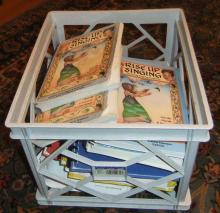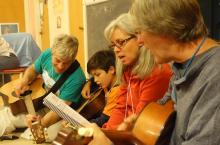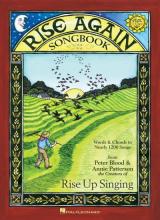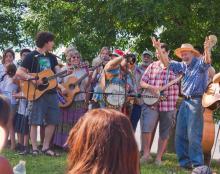Why Pete matters
We are posting things people are writing about why Pete matters for our time and the future of our planet. - Annie & Peter
Annie DiFranco:
I've seen Pete change the world around him. I've seen him set about fixing things big and small, in an everyday kind of way. And I think if I've ever known peace in this world, it's been in his voice.
Billy Bragg:
Why did Pete Seeger, who has died aged 94, matter? Because for over 75 years he stood true to his original vision, he never wavered. Even when his beliefs had a huge impact on his life and career: he never sold out. He wasn't just a folk singer, or an activist: he was both.
Pete believed that music could make a difference. Not change the world, he never claimed that – he once said that if music could change the world he'd only be making music – but he believed that while music didn't have agency, it did have the power to make a difference.
Shaped by that 30s leftwing mentality of the New Deal, Pete saw songs as political acts – for him these were people's songs – ways for the working class to express themselves. It doesn't matter that this was later superseded by rock and roll and changed beyond recognition – Seeger was there at the beginning and he never stopped.
When you shook his hand you knew you were shaking hands with someone who had crossed America with Woody Guthrie, who had marched with Martin Luther King and who had stared down McCarthyism – he embodied those great struggles. Other artists, like Bruce Springsteen, have recognised that and have seen Seeger as a touchstone, as someone who showed that songs were more than just making records and doing gigs. By choosing his repertoire carefully, Seeger brought the work of artists who had never achieved great success in their lifetimes to a mainstream audience. In the 1950s he put songs by Leadbelly and Woody Guthrie into the charts and royalties into the hands of their families.
He was already old the first time I met him – we were at a Canadian folk festival, where – as well as doing my own spot – I was invited to take part in a workshop where various artists played songs together. I agreed to take part in a Woody Guthrie workshop and when I turned up I saw that I was set to play with Ramblin' Jack Elliott – Woody's right-hand man – Arlo Guthrie and Seeger. I thought: I'm completely busted here. I busked it and at the end Seeger stood up and in his reedy voice he started to sing This Land is Your Land. Guthrie and Elliot did a verse, but when it came to my turn I had to say sorry folks – that land was not my land – we just don't learn this song in England. Seeger was so supportive and understanding.
Another time, when I was with Seeger and Arlo Guthrie again, this time to see Woody Guthrie inducted into the Rock and Roll Hall of Fame, Seeger – who must have been in his 70s – disappeared. When I turned around he was lying on his back, elbows under his hips, cycling his legs in the air. He was just something else.
Seeger was criticised as a Stalin apologist, but he was honest about it and regretted his own naiveté. Like many at that time, he saw that the idealism that seemed to manifest itself in the USSR had been totally undermined by totalitarianism. He wasn't afraid to admit he had been wrong, and – despite the insults people threw at him – he was a patriot. He believed in America and liberty – but not just in the liberty to make money, his idea of freedom was broader than that.
Sign up for the Sleeve Notes email: music news, bold reviews and unexpected extras Read moreHe was also criticised for turning against his protege Bob Dylan, but I think that was misunderstood. Yes, he did try to get Dylan to turn down his amplifier at Newport in 65. But the thing that angered Seeger was not the fact that Dylan had gone electric – he'd applauded Muddy Waters electric set earlier that day – he was angry because he couldn't hear the lyrics. The words, the context, was everything. Seeger, who had faced a spell in prison because of the words he sang, had more reason to be angry than most.
Is anyone carrying the light, continuing the tradition? Arguably Springsteen, or artists like Tom Morello who does solo shows wearing caps with the IWW [Industrial Workers of the World] logo and playing only political songs. But it is hard to find someone who has been around for so long, fought so many causes and seen so many things. I will miss him. I will miss him because every time I shook his hand, I knew I was shaking hands with history. (orig. printed in The Guardian)
From Peter Ross (San Francisco Folk Music Society):Pete had an important role in the song "We Shall Overcome" that's not too well-known. Wikipedia's long article on the song at https://en.wikipedia.org/wiki/We_Shall_Overcome says: Pete Seeger, a founding member and for three years director of People's Songs, learned it from Horton's version in 1947. Seeger writes: "I changed it to 'We shall'... I think I liked a more open sound; 'We will' has alliteration to it, but 'We shall' opens the mouth wider; the 'i' in 'will' is not an easy vowel to sing well..." Seeger also added some verses "We'll walk hand in hand" and "The whole wide world around".
The reference is to Seeger's book, Where Have All The Flowers Gone: A Musical Autobiography. It's where I first learned about Pete making the change.
The section of the Wikipedia article on the Role of the Highlander Folk School also mentions this factoid, that I like a lot: "In 1957, Seeger sang for a Highlander audience that included Dr. Martin Luther King Jr., who remarked on the way to his next stop, in Kentucky, how much the song had stuck with him."
A PBS documentary on Pete not long ago, maybe after he died, also mentions Pete teaching the song to MLK at the Highlander School.
From Harry Belafonte (spoken at SeegerFest at Lincoln Center Out of Doors on July 20, 2014):
The great reward for having lived 88 years is that for almost a century I was able to meet and to serve some of the greatest social activists and thinkers of our time.
None more exemplified the joy of that journey than did my friend Pete Seeger. It was another great figure, by the name of Paul Robeson, who said “artists are the gatekeepers of truth, they are civilizations’ radical voice.” For many of us, the embodiment of that observation could always be found in the humanity that Pete Seeger displayed in his every deed.
His courage was unflinching; his commitment to justice, irreversible. Knowing that there is inevitably a price to pay when speaking truth to power when facing the House Un-American Activities Committee, Pete understood "that although the House Un-American Activities Committee had the power to cage the singer, they did not have the power to cage the song.”
Pete’s song was sung for all of us. Through our hymns he introduced us to ourselves. “Wimoweh,” the early call-out from an anguished black apartheid South Africa, to a most indifferent world, was heard by many of us for the first time, and Pete was its courier. When Pete and the Weavers sang it, we danced the hora: “Tzena, Tzena, Tzena,” the joyous song of hope from young Jews in the Negev, only to be led to the tragic melodies of today sung by Shadia Mansour, and the Palestinian hymns of anguish for innocent children lying lifeless on the beaches of Gaza.
When last we spoke, “Where Have All the Flowers Gone” was on Pete’s mind. We chatted about how could so much good that was on our horizon be so swiftly taken from us?
But for all the world’s turmoil, Pete never blinked on the question as to whether or not our humanity had enough love in its power to triumph over our addiction to our inhumanity.
It was at Highlander, nestled in the mountains of Tennessee where first Martin Luther King, Jr. heard “We Shall Overcome.” It was Pete who sang it to him and awakened the world to this slave song that became the anthem sung by a universe hungry for human dignity.
Pete made all of this his, made it his mission; but most of all he made the ending of our pain his common cause. And he was willing to settle; for the only reward he would want would be the human triumph over evil.
How long will it be before the space he once occupied be filled by another someone the human heart can trust?
Pete Seeger left us a legacy. He left it for every Native American languishing on the reservations in America; for every black man, woman and child, in the largest prison population in the world; for everyone hungry; for every refugee in the world.
Pete left us all attended to by his art and his incredible humanity.
I thank you all for coming to share this festive moment and to permit me to be a part of that celebration. Thank you. - Harry Belafonte
Rick Harlan (Why "Quite Early Morning" is a song for our time):
In the 1963 March on Washington for Civil Rights and Jobs, we remember the “I Have a Dream” speech. I watched the whole march and rally glued to our family’s TV, and I remember there was a lot of singing! Mahalia Jackson. Bob Dylan made a big impression on my newly 16 year old heart and mind. No Pete Seeger himself (he was blacklisted) but Pete songs, yes. Peter, Paul and Mary sang Pete’s and Lee Hayes’ immortal song composed by Weaver members Lee Hayes and , “If I Had a Hammer.” And Odetta sang Pete’s version of “We Shall Overcome”, right there on the steps of the Lincoln Memorial.
They all sang and spoke on the steps of the Lincoln Memorial. Decades later and not long before he died, Pete Seeger finally sang on those steps, when Barack Obama was inaugurated President. Unfazed by the honor, Pete agreed to sing This Land Is Your Land, as long as the often left-out verses, the ones about welfare lines and about private property, would be sung!
Well, four years after the March on Washington, Martin Luther King Jr. started speaking out beyond civil rights. He named the three evils of racism, militarism and materialism/poverty. And he was killed a year later.
For many reasons, those times were a dark hour; but one that passed a torch to a new generation of leaders. Within a year, of MLK’s death, Pete Seeger wrote a song about how “the darkest hour” is “just before the dawn” if we can “heed these early warnings”.
The song was titled "Quite Early Morning". Many songs later in life Pete still held it as one of his two most favorite songs. Today I hold "Quite Early Morning" as a hopeful song, a needed song. It could be a kind of global theme song, here amidst increasing dangers at the beginning of what could be our last millennium.
Even the ever-positive Pete Seeger said (in his biography in film, Power of Song) that he wasn’t sure humans would be around in 100 years! He said that meant that what each of us do “could make the difference”.
Things have hardly improved since the film was made--what with growing climate catastrophe and accelerating militarism, the authoritarian and corporate surveillance partnerships, nuclear threats getting worse; increased extinctions; and the disappearance of safe places for drinking water and food-growing…..
In the face of all that we can sing it like our lives depended on it!










